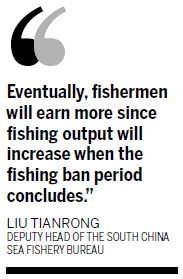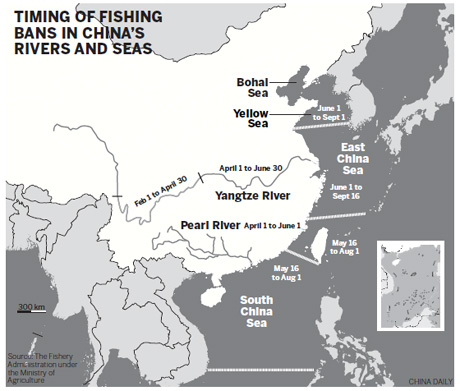Economy
Fishing ban to ease problems in Pearl River
By Jin Zhu (China Daily)
Updated: 2011-04-01 13:55
 |
Large Medium Small |
Beijing - A two-month ban on fishing starting from April will be imposed on the Pearl River valley to preserve the area's biodiversity and improve the water quality of China's third longest river.

The ban will be applied annually and will cover the 2,400-km Pearl River, its tributaries and some lakes. The total length affected will be 5,365 km, fishery authorities said.
The ban covers waters in six provinces and regions, including Jiangxi, Hunan and Guangdong provinces, as well as the Guangxi Zhuang autonomous region.
It is the third such ban in China, following the prohibition on fishing in four seas since the 1990s and an annual three-month fishing ban on the Yangtze River since 2003.
Fishery officials and experts said the two-month fishing ban will help restore the number of fish in the river and improve water quality.
The Pearl River was once home to 400 varieties of fish, including many rare species such as Chinese sturgeon and giant salamander. But years of over-fishing and increasing construction work over the river have led to a decline in fishing output and some rare species have not been seen for years, Li Yanliang, deputy head of the Fishery Administration under the Ministry of Agriculture, told China Daily on Thursday.
Over-fishing is a serious problem on the Pearl River. For instance, a 200-km section of the river between Guangxi and Guangdong now supports more than 5,000 fishermen, a number that is far beyond the section's capacity, Li said.
Meanwhile, nearly 1,300 hydropower stations and 96,500 water conservancy works on the Pearl River and its tributaries have hindered the propagation of some fish species, official figures showed.
An increasing number of environmental emergencies in recent years have also polluted water and killed fish. Statistics from China's Fishery Eco-environment Report showed that 165 pollution incidents occurred in the Pearl River in 2009, leading to losses totaling 56 million yuan ($8.55 million).
The fishery authorities expect that the ban will give time for fish fries to grow, bringing fishermen a better output after the two months come to an end.
The South China Sea Fishery Bureau under the Ministry of Agriculture plans to put some 6 million fish fries into the river during the ban period to sustain fishery resources.
"Eventually, fishermen will earn more since fishing output will increase when the fishing ban period concludes," Liu Tianrong, deputy head of the South China Sea Fishery Bureau, told Guangzhou-based Yangcheng Evening News.
The fishing ban on the Yangtze River since 2003 has proved the effectiveness of such measures.
For example, there was almost no mitten crab output in the Yangtze River in 2000. Thanks to a few years of fishing moratorium, the crab output surpassed 10 tons in 2007, according to the ministry.
Chen Zhisheng, a fisherman living in Zhaoqing city in Guangdong province, told Legal Daily that he once worked all night and only caught a 6-kilogram carp.
But other fishermen opposed the ban, arguing the suspension period is too short to produce any positive results.
He Yayou, a 65-year-old fisherman in Zhaoqing, told Guangzhou Daily that a two-month ban is useless because, according to his experience, it would take at least a five-year ban to increase fishing output significantly.
He, who caught a 35-kg fish three decades ago - the only time he has seen a catch that big - said that instead of a ban the fishery authorities should severely punish people who fish with electronic tools, which kill a lot of fries as well as big fish and cause the greatest harm to the fishing industry.
As many of the 100,000 fishermen who will be affected by the ban have no other skills, Liu Tianrong from the South China Sea Fishery Bureau said that local governments will give subsidies to fishermen who live on boats and make their living only by fishing, to make up for any losses.
Nearly 1,600 poor fishermen who live on boats in Hunan province will receive 10,000 yuan to 20,000 yuan of government subsidies to settle on the riverside, the provincial government said.

| 分享按鈕 |



